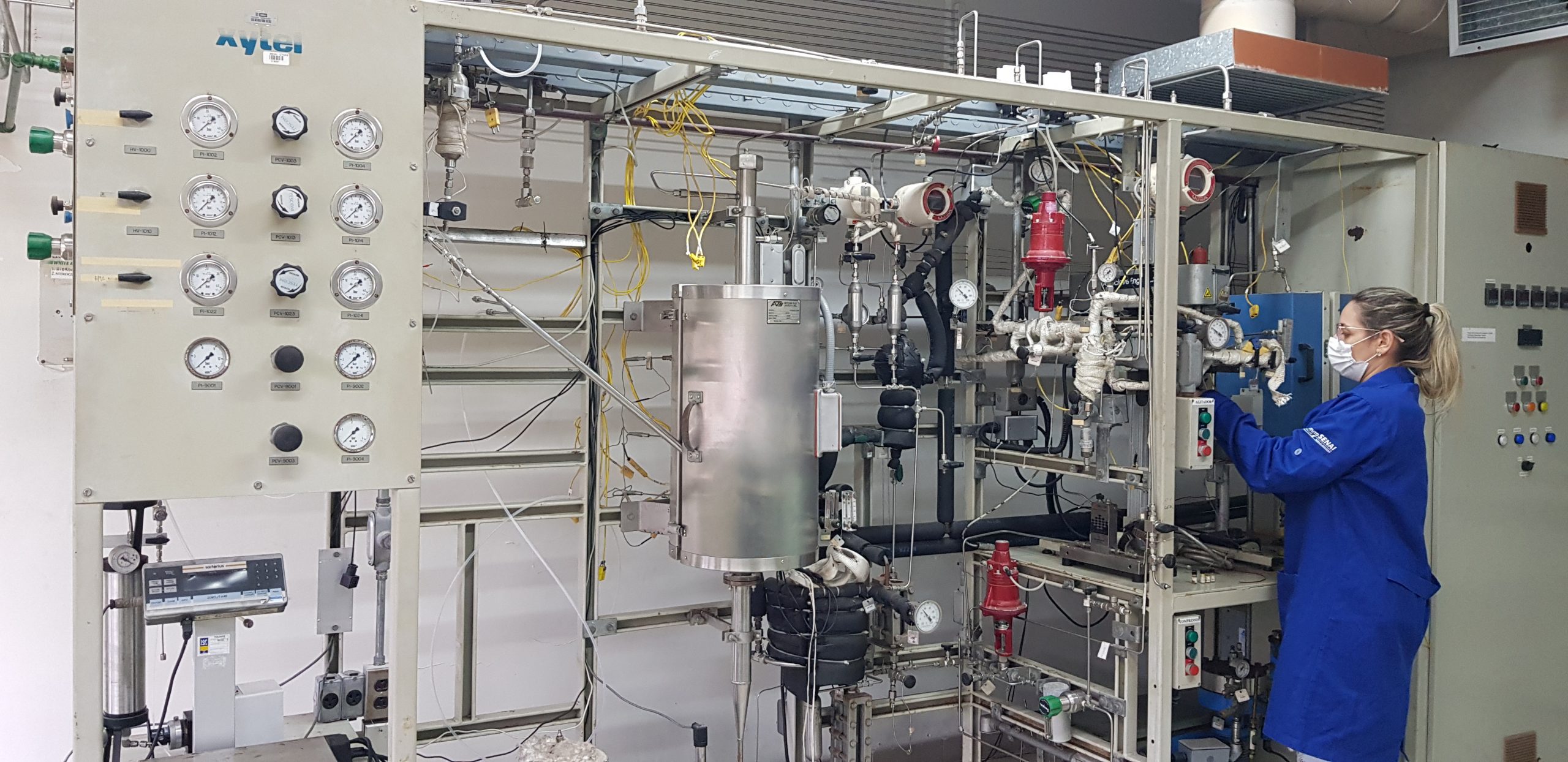SENAI intensifies research on glycerin as feedstock for Sustainable Aviation Fuel
Published February 23rd, 2022
The National Service for Industrial Training (Serviço Nacional de Aprendizagem Industrial, SENAI) and the German Technical Cooperation for Sustainable Development (GIZ – Deutsche Gesellschaft für Internationale Zusammenarbeit GmbH) have just closed a partnership for the production of Sustainable Aviation Fuel (SAF) at the SENAI Renewable Energy Innovation Institute (ISI-ER) located in Natal, Rio Grande do Norte (RN). In total, more than R$ 4.5 million will be invested by 2023 for adaptation works on existing reactors and equipment to produce sustainable fuel, aiming at reducing greenhouse gas emissions in aviation.
The renewable synthetic kerosene, or e-kerosene, as it is also called, will be produced from glycerin, a co-product of biodiesel – through the chemical process called Fischer-Tropsch. Glycerin will be transformed into synthesis gas (carbon monoxide and green hydrogen) and, after chemical and industrial processes, it will be transformed into fuel. When consumed the carbon balance tends to be neutral, so the fuel will not contribute to global warming.
According to existing national and international regulations by the National Agency for Oil, Gas and Biofuels (ANP) and the American Society for Testing and Materials (ASTM), the renewable fuel can be mixed with fossil aviation kerosene in up to 50% of the composition.
“The mobilization of society, governments and companies to reduce emissions is increasing and in the aviation sector this is not different. This partnership is very important to develop alternatives for the decarbonization of Brazilian aviation, as well as to value local vocations by combining renewable energies and industrial co-products for the production of SAF”, explains Dr. Markus Francke, director of GIZ’s H2Brasil Project.
Two GIZ projects in Brazil have worked together to make this partnership happen: H2Brasil and ProQR – Climate-neutral Alternative Fuels. Already in 2019, ProQR, together with its partners in the Ministry of Science, Technology and Innovations (MCTI), supported the realization of the study “Generation of synthetic aviation fuels from glycerin from biodiesel production”. “This new project will enable the realization of this study with the development of a pilot plant for the production of this alternative aviation fuel at ISI-RN,” explains Eduardo Soriano, responsible for the GIZ project at MCTI.
The project
The duration of the project will be two years, a period in which researchers should also estimate when the new fuel could reach the market. Studies developed in the last 10 years by researchers leading the project, already identify advantages in the use of glycerin as a feedstock. “It was found, for example, that the CO2 emission for the production of synthetic fuel with this raw material is practically zero,” notes the director of ISI-ER, Rodrigo Mello.
Glycerin is a co-product of the biodiesel production. The abundance in the Brazilian market is another advantage of the project. “We have more than 400 million kilos of glycerin per year produced in Brazil and transforming this feedstock into clean energy is certainly among the noblest destinations that the country can provide, especially in our continuous work on mitigating greenhouse gases,” adds the director of ISI-ER. “It is a project in partnership Brazil and Germany, but the solution that we work on to develop will certainly be an option for the whole world, where there are conditions for the production of this raw material,” Mello stresses.
The ISI-ER
The SENAI Institute for Innovation in Renewable Energies (ISI-ER) is part of the largest private network of research, development and innovation institutes created in Brazil to meet the demands of industry, composed of 26 SENAI Innovation Institutes. The Network focuses on applied research, the practical use of knowledge when developing new products and customized solutions for companies or ideas that generate business opportunities. Since it was created in 2013, more than R$ 1.2 billion have been mobilized in 1,332 RD&I projects. ISI-ER has been in operation at SENAI-RN’s Innovation and Technology Hub (HIT) in Natal since 2018, and was officially inaugurated in June 2021, with the completion of the facilities and the full operation of the laboratories.
The SENAI
Created in 1942 at the initiative of entrepreneurs in the industrial sector, SENAI is the largest institution of professional and technological education in Latin America, maintained by the Brazilian Confederation of Industry (CNI). It promotes technical education programs ranging from short-term qualification courses to master’s programs covering a wide range of industrial technologies.
GH2 and German Cooperation
The Brazil-Germany Cooperation for Sustainable Development has been working for decades in the areas of sustainable energy and energy efficiency. More recently, it has been supporting the improvement of legal, institutional and technological conditions for the expansion of the green hydrogen (GH2) market in the country. In the coming years, with the support of the Ministry of Mines and Energy (MME) and the Ministry of Science, Technology and Innovations (MCTI), actions will be implemented for the development and financing of innovative ideas and technological projects, construction of laboratories, studies, professional education and training in the area of green hydrogen, among others.
Article prepared in cooperation with GIZ Brazil and SENAI.
